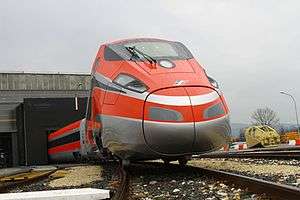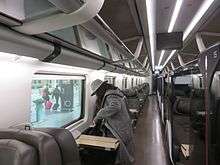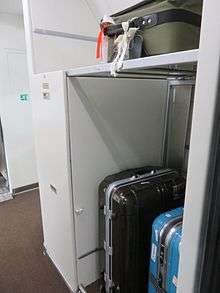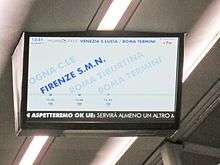Frecciarossa
Frecciarossa is a high-speed train of the Italian national train operator, Trenitalia, and a member of the train category Le Frecce. The name, which, if spelled "Freccia rossa" means "Red arrow" in English, was introduced in 2009[1] after it had previously been known as Eurostar Italia. Frecciarossa trains operate at speeds of up to 300 km/h (190 mph). Frecciarossa is the premier service of Trenitalia and competes with italo, operated by Nuovo Trasporto Viaggiatori.
| Frecciarossa | |
|---|---|
.jpg) Frecciarossa ETR.500 train | |
| Specifications | |
| Maximum speed | 300 km/h (190 mph) |
| Frecciarossa 1000 | |
|---|---|
 Frecciarossa ETR.1000 train | |
| Specifications | |
| Maximum speed | 400 km/h (250 mph) |

(Feb 2017)

(Feb 2017)

(Feb 2017)
Routes
- Turin/Brescia - Milan - Reggio Emilia AV - Bologna - Florence - Rome - Naples - Salerno
- Turin - Milan - Brescia - Verona - Vicenza - Padua - Venice - Monfalcone - Trieste
- Venice - Padua - Bologna - Florence - Rome - Naples - Salerno
- Bergamo - Brescia - Verona - Bologna - Florence - Rome
- Udine - Pordenone - Treviso - Venice - Padua - Vicenza - Verona - Brescia - Milan
- Milan - Reggio Emilia AV - Bologna - Rimini - Ancona - Pescara - Termoli - Foggia - Bari - Brindisi - Lecce
- Milan - Bologna - Florence - Rome - Naples - Salerno - Potenza - Ferrandina - Metaponto - Taranto
- Venice - Padua - Vicenza - Verona - Brescia - Milan - Pavia - Genoa
- Venice - Padua - Ferrara - Bologna - Florence - Rome - Naples - Salerno
- Perugia - Arezzo - Florence - Bologna - Reggio Emilia AV - Milan - Turin
- Milan - Reggio Emilia AV - Bologna - Florence - Rome - Naples - Salerno - Agropoli - Sapri
Rolling stock
- ETR.500: non-tilting, train made of eleven passenger coaches (one with cafe/restaurant service) with 574 seats moved by two E.404 locomotives, speeds up to 300 km/h (190 mph).
- Frecciarossa 1000: non-tilting, electro-train made of eight passenger coaches (one with cafe/restaurant service) with 457 seats, speeds up to 400 km/h (250 mph). Between June 2017 and May 2019, some Frecciarossa services have been operated with two non-communicating Frecciarossa 1000 trains, with 16 passengers coaches and 914 seats; this allows to double the train capacity without decreasing speed and increasing travelling times. The Frecciarossa 1000 was developed by AnsaldoBreda and Bombardier Transportation (which is designed to operate commercially at 360 km/h (220 mph), with a technical top speed of over 400 km/h (250 mph)).
Frecciarossa trains travel on dedicated high-speed railway lines and, on some routes, also on conventional railway lines with lower speed limits. Current limitations on the tracks set the maximum operating speed of both types of trains to 300 km/h (190 mph).
Accidents and incidents
On 6 February 2020, a Frecciarossa train derailed at Ospedaletto Lodigiano, killing two people and injuring 27 others.[3]
See also
External links
![]()
References